

Unintended Consequences in School Accountability Policies. Rajashri Chakrabarti and Noah Schwartz* Over the past two decades, state and federal education policies have tried to hold schools more accountable for educating their students.
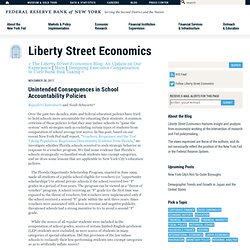
A common criticism of these policies is that they may induce schools to “game the system” with strategies such as excluding certain types of students from computation of school average test scores. In this post, based on our recent New York Fed staff report, “Vouchers, Responses, and the Test Taking Population: Regression Discontinuity Evidence from Florida,” we investigate whether Florida schools resorted to such strategic behavior in response to a voucher program.
We find some evidence that Florida’s schools strategically reclassified weak students into exempt categories, and we draw some lessons that are applicable to New York City’s education policies. The Distributist Review. Want jobs? Encourage immigration. Google employs 31,300 people.
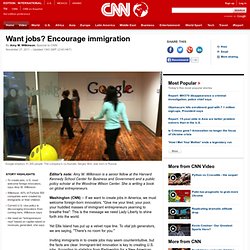
Facing Inequality. In the Weekly Standard, Matthew Continetti concedes the reality of income inequality, but concludes that it’s simply not the government’s place to intervene: Too quick to dismiss the occupiers, too convinced that the bad economy will doom Obama’s reelection, too distracted by the silliness of the Republican primary, too beholden to the egalitarian assumptions of the left, Republicans and conservatives have not responded coherently to the arguments put forward by their newly invigorated opponents. … The way out is to reject the assumption that government’s purpose is to redress inequalities of income.
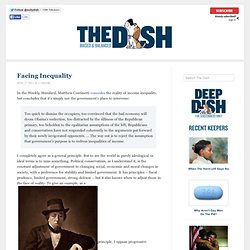
I completely agree as a general principle. Micro Jobs. Why Bitcoin is a Foundational Change That Won’t Go Away and Could Change Everything. Blue sky money one - the dual mandate. Leland Yeager's (ed.)
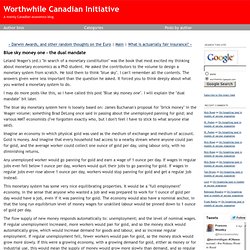
"In search of a monetary constitution" was the book that most excited my thinking about monetary economics as a PhD student. He asked the contributors to the volume to design a monetary system from scratch. He told them to think "blue sky". Aquinum's Razor: A Theory of Economics. A Theory of Economics: Here is how the banker's game works. Here is how the banker's game works: 1) Get the government to issue some currency (cash -- paper or reserves at the central bank -- reserves are government issued cash central bank deposits).
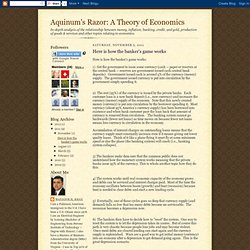
Government issued cash is around 5% of the currency (money) supply. The government issued currency is put into circulation by the government simply spending it. 2) The rest (95%) of the currency is issued by the private banks. Each customer loan is a new bank deposit (i.e., new currency) and increases the currency (money) supply of the economy. Accumulation of interest charges on outstanding loans means that the currency supply must constantly increase even if it means giving out lower quality loans. 3) The bankers make dam sure that the common public does not understand how the monetary system works meaning that the private banks issue 95% of the currency. 4) The system works until real economic capacity of the economy grows and debts can be serviced and interest charges paid.
QuNeo, Multi-touch Open Source MIDI & USB Pad Controller by Keith McMillen Instruments. QuNeo is a different species of pad controller for electronic musicians, DJs, VJs and DIY hackers.

While it covers all of the functionality of other pad controllers, QuNeo adds the power of touch recognition in other dimensions. QuNeo Features Tactile Pads, Sliders, Rotary Sensors and Switches Each of the 27 pads, sliders and rotary sensors are pressure, velocity, and location sensitive. Even the 17 switches respond to how hard you press. LED Light Feedback. Roger Craig Broke Jeopardy's Record, with an App. 16 November '11, 02:03am Follow The man below is Roger Craig. He broke Jeopardy’s all-time money record in a single game, surpassing previous champion Ken Jennings) during his second round. He then went on to win every game taped for that week and returned for the Tournament of Champions earlier this month. Economic Mobility Project. Demand, Demand, Demand. United States of Hunger. Casey Mulligan noted Wednesday on Economix that United States spending on food stamps had skyrocketed since the recession began.

A new Census Bureau report provides a look at just how big the program has become. Last year, more than one in 10 families received food stamps, with some states having significantly higher participation rates. In Oregon, the share was nearly one in five. Here’s a map showing what share of families in each state received these benefits to help them buy food: Census Bureau In Oregon, 17.8 percent of families received food stamps, officially known as Supplemental Nutrition Assistance Program (SNAP) benefits, the highest rate in the nation.
Cowen: Whatever Happened to Discipline and Hard Work? Tyler Cowen:
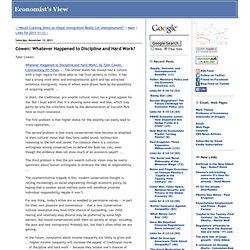
Generation Jobless: The Toll on Parents When Kids Return Home. Why Americans Won't Do Dirty Jobs. Skinning, gutting, and cutting up catfish is not easy or pleasant work.
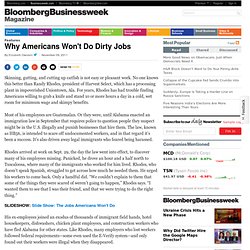
No one knows this better than Randy Rhodes, president of Harvest Select, which has a processing plant in impoverished Uniontown, Ala. For years, Rhodes has had trouble finding Americans willing to grab a knife and stand 10 or more hours a day in a cold, wet room for minimum wage and skimpy benefits. Most of his employees are Guatemalan. Or they were, until Alabama enacted an immigration law in September that requires police to question people they suspect might be in the U.S. illegally and punish businesses that hire them. How Technology is Recreating the 21st-century Economy. W.
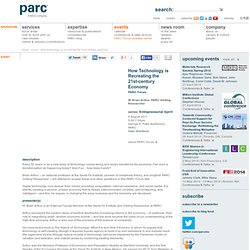
Brian Arthur, PARC Visiting Researcher series: Entrepreneurial Spirit 4 August 20115:30-7:00pmGeorge E. Spatial frictions. As of 2008, for the first time in history, more than half of the world’s populations live in cities. Understanding urbanisation and its affect on living standards is key for policymakers looking to make informed decisions in the years to come. One issue for city dwellers is ‘spatial frictions’. The world is full of spatial frictions, as revealed by the costs of moving goods and people across space. These frictions influence where consumers and firms locate and how they interact. Trade frictions for shipping goods across cities induce consumers and firms to spatially concentrate to take advantage of large local markets. Oligarchy, American Style. Anyone who has tracked this issue over time knows what I mean. Whenever growing income disparities threaten to come into focus, a reliable set of defenders tries to bring back the blur.
Think tanks put out reports claiming that inequality isn’t really rising, or that it doesn’t matter. Pundits try to put a more benign face on the phenomenon, claiming that it’s not really the wealthy few versus the rest, it’s the educated versus the less educated. So what you need to know is that all of these claims are basically attempts to obscure the stark reality: We have a society in which money is increasingly concentrated in the hands of a few people, and in which that concentration of income and wealth threatens to make us a democracy in name only. The budget office laid out some of that stark reality in a recent report, which documented a sharp decline in the share of total income going to lower- and middle-income Americans.
QUOTE: The Summum Bonum (Highest Good) of Social Capitalism.
The Extraordinary Collapse of Jatropha as a Global Biofuel. The “extraordinary collapse of Jatropha as a biofuel” appears to be due to “an extreme case of a well intentioned top down climate mitigation approach, undertaken without adequate preparation and ignoring conflict of interest, and adopted in good faith by other countries, gone awry bringing misery to millions of poorest people across the world”. Green car congress has coverage In 2003, the Planning Commission of India decided to introduce mandatory biofuel blending over increasingly larger parts of the country with a target of 30% by 2020. Seven Billion: The Real Population Scare is Not What You Think. Unclassified. Work & Technology. OccupyWallStreet (OWS) Collapse_of_Civilization.